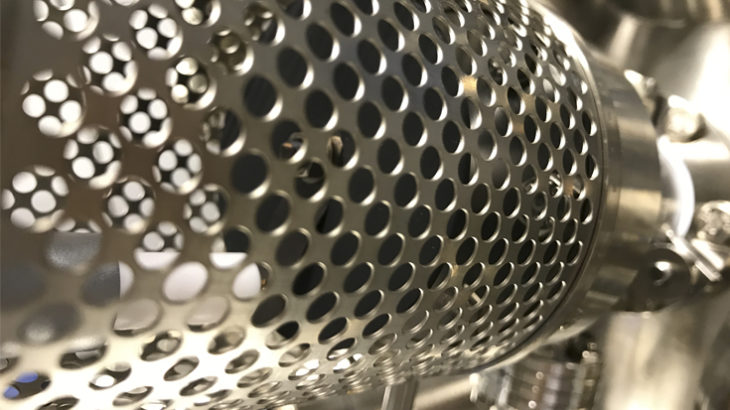Spotlight On: X-ray Photoelectron Spectroscopy Multi User Facility

Each month we post a new edition to the SES ‘Spotlight On…’ series, showcasing equipment at our institutions, providing information and case studies for interested researchers/industries, and promoting better use of already available equipment.
The UCL X-ray Photoelectron Spectroscopy Multi User Facility holds a suite of two X-ray photoelectron spectrometers (XPS). XPS is a widely used surface analysis technique employed to determine elemental composition and chemical environment. It is used by a very wide range of workers in physical sciences, engineering, medical sciences, etc. Our facility offers access to two spectrometers. Users are trained to run their own samples and analyse their own data.The UCL XPS facility has recently expanded and is now home to an Ultraviolet Photoelectron Spectroscopy (UPS) system. Employing lower levels of energy than the XPS system, UPS allows researchers to look in detail at the outermost electrons of a material. This is of interest to chemists who are especially interested in measuring and looking at chemical bonding and arrangement.
Facilities like this one at UCL have previously had a narrow user base, as the discipline specific and high-tech nature of the equipment provided a sizeable barrier of entry to new researchers. Now, the UCL XPS facility is widely used by various departments across UCL’s Science community, as well as other universities further afield, and has a significantly more user-friendly interface and training programme.
Name of Equipment
X-ray Photoelectron Spectroscopy Multi User Facility
Current High-level Research:
- UCL Chemistry: New solar cell materials (Dr. Robert Palgrave), New allotrope of phosphorous (Dr. Christoph Salzmann), Superhydrophobic coatings (Prof Ivan Parkin)
- Mullard Space Science Laboratory: studies on ESA spacecraft components
- University of Oxford: Studies of nanoparticle sensors (Prof Richard Compton)
Who has access?
All UCL based researches with some limited time to industry and academic researchers from other institutions
Is there preferential access given to a particular type of researcher? E.g. Based on institution, field of research
UCL researchers have priority access, but access can also be granted to non-UCL researchers
Any SLAs or standards (eg ISO, ..) associated with the facility?
None
Does it require an on-site visit to use the facility/equipment?
The normal mode of access is for users to run their own samples. If consultancy or academic collaboration is entered into then samples can be sent
Are there costs associated/fees? Please explain.
Fees are charged to maintain the service, please contact the facility manager, Dr. Robert Palgrave.
Can it be bought as a service with access to a team of experts?
Yes, this can be done through UCL Consultants.
Interview with Dr. Deepak Kalaskar
What is your area of research?
Synthesis and characterisation of novel Biomaterials to repair and restore diseased tissues and organs.
Why did you choose the XPS facility?
The surface and bulk properties of materials have a profound effect on their success and failure when implanted in the human body. Using XPS, we study surface properties of materials and co-relate them with biological behaviour. Knowledge gained through this process helps us understand why certain biomaterials fail. This eventually helps us design better biomaterials based on clinical requirements for use in the human body.
What was your experience of the facility and team?
We have mainly collaborated with Dr. Robert Palgrave to use the XPS platform. He and his research group has been collaborating with us since 2015 on XPS data acquisition, analysis and discussions on scientific data. Sample preparation for XPS requires a lot of care and attention, however thanks to the ability to employ multiple sample analysis and automation, we’ve experienced a significant increase in analysis throughput.
Dr. Deepak Kalaskar is Lecturer in Cellular Engineering, Department of Nanotechnology, Div of Surgery & Interventional Sci, Faculty of Medical Sciences at UCL
Main contact & applications:
Department of Chemistry
Dr. Robert Palgrave
E: r.palgrave@ucl.ac.uk
Department of Chemistry
UCL
20 Gordon Street
London
WC1H 0AJ
Potential relevant disciplines:
Condensed matter physics, chemistry, materials science, engineering, medical sciences

